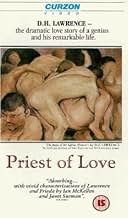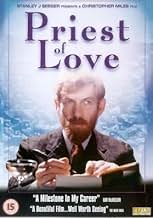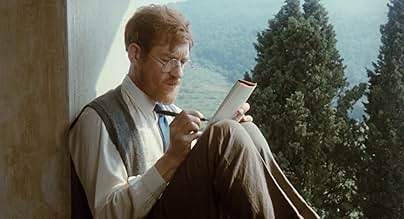Ajouter une intrigue dans votre langueFollowing the banning and burning of his novel, "The Rainbow", D.H. Lawrence and his wife, Frieda, move to the United States, and then to Mexico. When Lawrence contracts tuberculosis, they r... Tout lireFollowing the banning and burning of his novel, "The Rainbow", D.H. Lawrence and his wife, Frieda, move to the United States, and then to Mexico. When Lawrence contracts tuberculosis, they return to England for a short time, then to Italy, where Lawrence wrote "Lady Chatterley's ... Tout lireFollowing the banning and burning of his novel, "The Rainbow", D.H. Lawrence and his wife, Frieda, move to the United States, and then to Mexico. When Lawrence contracts tuberculosis, they return to England for a short time, then to Italy, where Lawrence wrote "Lady Chatterley's Lover".
- Réalisation
- Scénario
- Casting principal
- Dr. Uhfelder
- (as Mike Morris)
Avis à la une
Picture opens in 1924 with Lawrence (Ian McKellen), wife Frieda (Janet Suzman) and their friend Dorothy Brett (Penelope Keith) en route to Taos, New Mexico, for a self-imposed exile at the house of art patroness Mabel Doge Luhan (Ava Gardner). Back in Britain his books have been banned by the censor, Herbert Muskett (an effectively stern cameo by John Gielgud).
In a typical scene, Lawrence becomes irrational at a party and out of control, slaps Frieda around violently and breaks all the dishes, causing a speedy departure from Taos. Also characteristic is couple's unsympathetic decision to send Dorothy away. Amongst flashbacks detailing economically Lawrence's youth in Cornwall, Miles emphasizes the duo's sojourn in Italy at a villa in Florence provided by a new patron, Angelo Ravagli (Maurizio Merli). Lawrence writes "Lady Chatterley's Lover" there, with impressive care for detail in footage shot at the same Italian printing press where the book was first printed.
Key scenes involve the fearless duo pushing relentlessly for the truth in a sexual manifesto in literature (establishing Frieda as D. H.'s literary collaborator) and tasteful scenes indicating his bisexuality (with a youth nude bathing at an Italian seashore), plus relentless selfishness in inviting Dorothy to bed and then spurning her suddenly.
Dominated by pastoral landscape photography, pic lacks a dramatic edge, with D. H.'s battle from afar with the censor and his impending death by tuberculosis carrying little impact. Coda has Rapagli replacing the deceased Lawrence in Frieda's life and a happy ending for the life-loving survivors, whose joyous celebrations comically extend to absent-mindedly leaving Lawrence's coffin behind at the train station.
Director Miles and actor McKellen create a Lawrence who engages one's intellectual sympathy and is an arresting multi-dimensional figure (even given to an hilarious Gielgud impersonation mocking the censor), but whose selfishness and physical manhandling of Frieda clearly cut off a viewer's emotional support for the character. Too infrequently seen in films, McKellen gives a bravura performance, all the more remarkable for its avoidance of easy empathy. Veteran of a one-woman show on stage as Frieda, Janet Suzman is given her head by Miles and turns in a flamboyant, explosive turn which prevents the film from being dominated by McKellen.
Supporting cast is well-chosen with Ava Gardner looking great and utterly convincing in her best role in years as duo's free-spirited American connection. British comedienne Penelope Keith is the spitting image of her real-life counterpart, but Miles has not curbed her natural comic bent in what should be a straight role. Amongst minor players, Mexican matinee idol Jorge Rivero is well-used as Gardner's sexy young husband, while Italian singer/heartthrob Massimo Ranieri is similarly appropriate as a virile young stud.
Working with stunning locations, Miles and lighting cameraman Ted Moore produce a series of spectacular deep-focus compositions, and wisely present the flashback material in sharp, luminous visuals rather than the cliche of soft-focus. Although Miles adopts a stately pace, he and editor Paul Davies use quick cutaways at the emotional highpoints of scenes, a device which acts to distance the audience from the characters. Joseph James' romantic musical score is good.
The film is just a bog standard biopic done from the write by numbers playbook. It hardly ever come close to the real D H Lawrence. The facts and events are there, all the wandering around the world etc, but you only have to read Lawrence's collected letters to know that the picture given here is rather superficial It isn't helped by some amateur dramatics style acting, particularly from a way below par Ian McKellen and Janet Suzman. A pet hate of mine is the lazy generic Northern accent adopted by most actors doing D H Lawrence. Ian McKellen made him sound as though he was brought up in Yorkshire rather than Notts. Admittedly the Nottingham/Derbyshire accent is hard to do. Robert Lindsey does it well, but then he comes from Ilkeston.
The other thing missing in this film is a sense of D H Lawrence's wit and humour, which can be seen very well in his letters, short stories and some of his poems. I also didn't like the way the script writer (Alan Plater in his soap writing mood) somewhat lazily bought into the feminist critique of the 1980s. D H Lawrence, who wrote very sensitively on women's issues, is made to seem as though he was a male chauvinist. Again, a more careful reading of his works would have shown this to be untrue.
So, overall, a pleasant enough journey round the world with some nice scenery and some good support actors. As another reviewer has pointed out, a bit like a dramatisation of an encyclopedia entry.
After leaving England the movie has the Lawrences landing in Taos, New Mexico where they were closely associated with the wealthy patron of the arts Mabel Dodge Luhan and the artist Dorothy Brett. In exchange for the original text of "Sons and Lovers" Dodge gave them a 160 acre ranch outside of Taos--a ranch that is now known as the Lawrence Ranch. The British artist Dorothy Brett lived on the ranch with the Lawrences, in a separate dwelling. Here is where the weakness of the movie started to become apparent to me and that is the lack of motivation for behavior. What was the basis of the Lawrence's relationship with Brett that resulted in their being close enough to come to the United States together and live on the same ranch.
The motivations for the various moves from country to country are not well established and the transitions are confusingly abrupt. Maybe what prompted the moves were no more than whims, but without any notice the Lawrences were all of the sudden in some place in Mexico, or some place in Italy, or some other place in Italy, on in Capri, or France. The same goes for the people in their lives. How did they ever get to know Mabel Dodge, or any of the other famous people that drifted in and out of their lives? There was no identification of these people beyond sometimes being given their names. For example, while in England we see the Lawrences socializing with John Middleton Murry and his paramour Katherine Mansfield, the latter not even being identified. People would suddenly appear, taking me some time to figure out who they were, like Lawrence's sister Ada. There were scenes that had Aldous Huxley visiting the Lawrences in Italy with the primary interaction between Huxley and Lawrence being over Huxley's painting an external wall lamp. Surely some relevant dialog could have been inserted there.
Ian McKellen gives a good performance as Lawrence, but even at that we get only a hint of an understanding of this complex man--I think I came away with a better understanding of Frieda than of her husband. We get only a hint of Lawrence's homosexual tendencies from an early scene that has him frolicking naked on the beach with a young friend. Dorothy Brett is portrayed as being a grinning simpleton. For her to have been a close friend to the Lawrences, surely there was more to the woman than what we see here.
Of course time is devoted to the writing and publication of "Lady Chatterley's Lover." The music accompanying these scenes is so irritatingly over the top, I suppose to emphasize the significance, that it would be more suitable for Henry's victory at Agincourt.
Some time is spent on Lawrence's efforts at painting in his last years, with the paintings in his exhibition in London being seized and the show closed down. Some of these paintings can now be seen at the La Fonda hotel in Taos. If you ever have a chance to see them, you will be convinced that it was best for Lawrence to devote his talents to writing. To call them erotic paintings, at least at this late date, is more than an overstatement.
I suppose this movie broke some ground as being a major commercial movie that had full frontal male nudity and, as McKellen notes with pleasure in his interview on the extras, it is the first commercial movie to portray an erect penis, albeit as a shadow on a wall.
I saw this in its original release in 1981 and have looked forward to seeing it again on DVD. The "director's cut" now on DVD has been edited from the original 125 minutes to 99 minutes. My memory is not good enough to remember exactly what was cut (I do remember a scene involving Lawrence's ashes that is no longer there), but what remains on the DVD I think is more disjointed and confusing than what was in the original. The cutting is puzzling, getting at an understanding of this complicated man demands a longer movie rather than shorter.
Perhaps the most positive result of seeing this movie would be to encourage you to read Lawrence's writings.
The lead performances are believable and interesting and the second half is more accessible and enlightening than the first as you get closer to the couple's lives and Lawrence's vigorous self belief. The first half though is played out too fast, moving very quickly across the globe with the man having hissy fits with little explanation. Nice support from Penelope Keith.
Probably needs watching more than once.
Christopher Miles did a wonderful adaptation of "The Virgin and the Gypsy" 10 years before he made this film. He certainly is a scholar of Lawrence and a talented filmmaker, so why was this film so charmless and seem so shallow.
I will give a couple of reasons: First, I saw the 99 minute recut of the film. I imagine/hope that the apparently lost original 125 minutes was less choppy and jumpy.
Second, Ian McKellan was a terrible choice for the lead. He simply was too much of a stage actor at this point of his career and he plays most scenes for the the benefit of the baloney.
Third, the beginning shows Lawrence having a nude swim with a homosexual lover. The rest of the movie is about his love affair with his German wife. It is just confusing and undercuts the rest of the movie as we expect him to run off and leave his wife for a man at some point.
Fourth, the movie portrays Lawrence as a one dimensional lone victim of censorship, surely there were other writers being censored at the time and many powerful people supporting his rights to freedom of speech. Making the censor a buffoon (played dully by John Gielgud) doesn't help, but seems to trivialize the issue.
Fifth, Miles may have been to close to the material. He wants to give us a lot of factual information about Lawrence, but the history lesson feels like a history lesson, and there is little dramatic tension. Janet Suzman as Frieda Lawrence seems to carry the weight of whatever dramatic tension there is.
The movie does have nice cinematography. However all the movies adapted from Lawrence's work also have great cinematography and much better characters and stories.
Le saviez-vous
- AnecdotesThis movie was released on the 51st Anniversary year of the death of author D.H. Lawrence.
- Citations
Herbert G. Muskett: [looking at a copy of Lawrence's book "Kangaroo"] It does not appear to be obscene in absolutely legal terms. Anti-British to the point of insanity.
Clerk to Herbert G. Muskett: Apparently, Mr. Lawrence is going to America.
Herbert G. Muskett: We must inform the authorities.
Clerk to Herbert G. Muskett: It's been attended to, Mr Muskett.
[reaching for the book]
Clerk to Herbert G. Muskett: Shall I take this?
Herbert G. Muskett: Leave it. I shall read it again. To make absolutely sure
[recommences intense study of the book]
- Versions alternativesAn abridged 99 minute "Centenary version" was released in 1985 in the UK to better box office and critical acclaim to commemorate the birth of D.H.Lawrence. As well as inevitable cutting of some material the shortened version also rearranges the placement of some of the flashback sequence and ends with Lawrence's death excluding the New Mexico epilogue. The short version is a properly re-prepared effort however with the appearance order end-credits redone to reflect the new positions in which characters first appear. Copies of the 1981 version, which was first released in the UK during the 1982 Falklands War when theatre going plummeted, now no longer exist.
- Bandes originalesThe Way We Get It Together
music by Francis James Brown and Stanley Joseph Seeger (as Joseph James)
Lyrics by Christopher Cone
Played by The Pasadena Roof Orchestra
Meilleurs choix
- How long is Priest of Love?Alimenté par Alexa


























